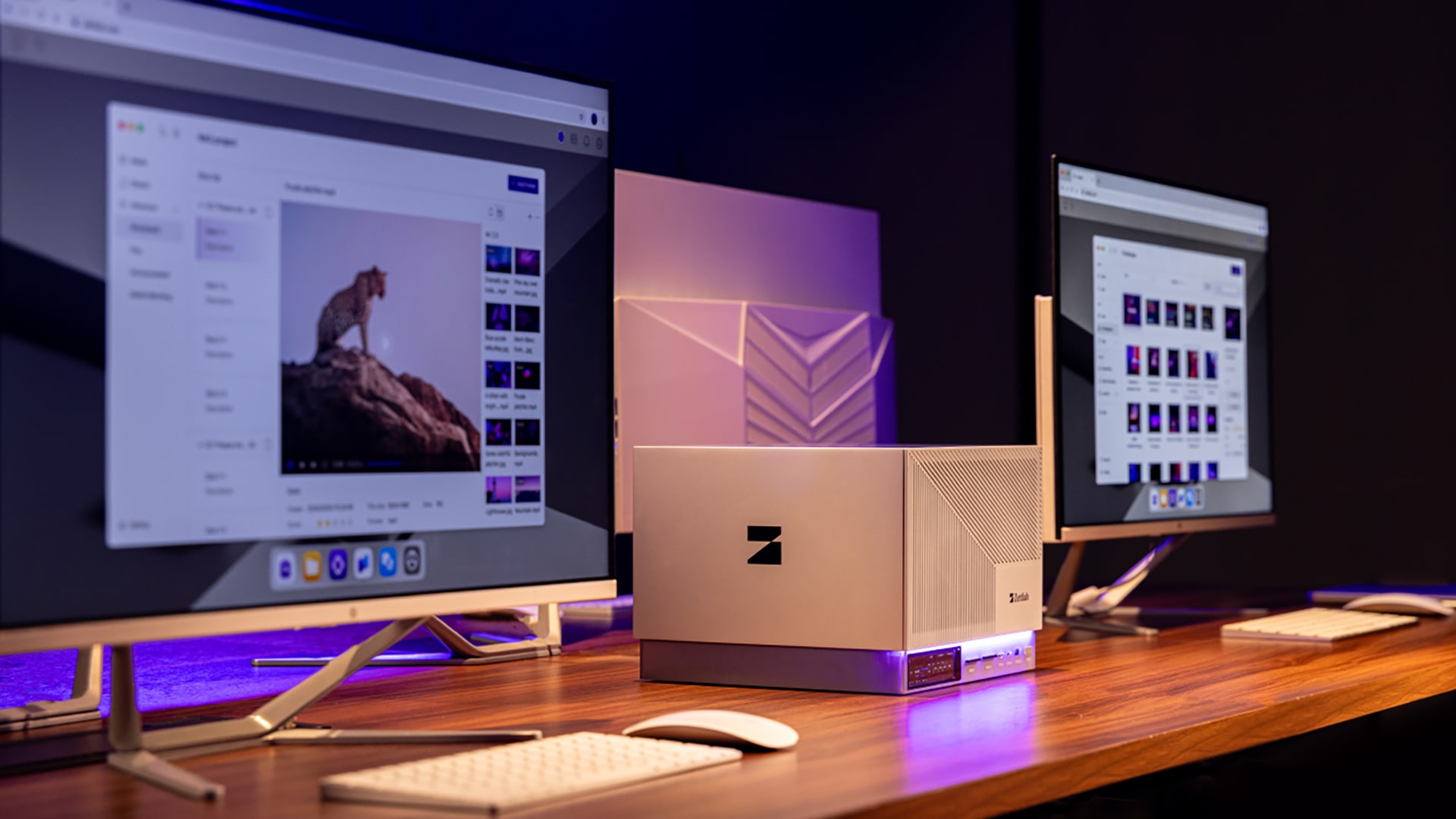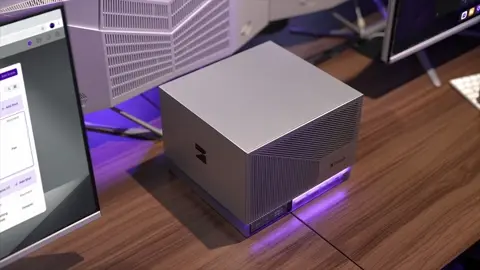In this year’s venture capital landscape, Zettlab stands out as a genuinely distinctive project. It reflects much of what investors are seeking today: a team spun out of tech heavyweight DJI, a focus on network attached storage (NAS) integrated with artificial intelligence, and strong technical barriers to entry.
But founder Noah Guo mindset has steadied beyond the highs of praise or the lows of skepticism.
In 2023, when venture funding hit a historic low, Guo resigned from his position at Narwal. Almost everyone questioned the move. Yet he saw it differently. “Everyone’s at the same starting line, swimming naked. That’s when the best opportunities appear,” he said.
Guo dived headfirst into the NAS category, an obscure and highly traditional niche. NAS can be understood as a form of private cloud: a storage device that connects to a network and provides a degree of computing capability.
Across the market, enterprise users make up roughly 60% of total NAS demand, with manufacturers in Taiwan holding relatively stable market positions. The remaining 40% comes from consumers and small and midsize studios, a fragmented segment divided among enterprise-grade NAS makers and hard drive companies.
Historically, NAS has had little connection to AI. When Zettlab began its user research, NAS users generally saw no need for it. During overseas ad campaigns, some viewers even mocked the idea, Guo recalled, saying that few could imagine what integrating AI into NAS might achieve.
Still, Guo trusted his instincts as an engineer. He first began working with AI back in 2014, debugging autonomous driving algorithms in Mohe, a town buried in ice and snow. It was also where he built his first self-driving car as a student.
From DJI to Narwal, Guo continued leading AI-related projects, witnessing the technology’s rapid evolution.
“To me,” he said, “the idea that NAS doesn’t need AI runs counter to common sense.”
A NAS, serving as a private data hub, is an ideal foundation for on-device AI agents. As new AI tools generate ever larger volumes of data, the real challenge is how to use that data effectively.
Zettlab envisions AI managing and interpreting vast amounts of local video data, searching, organizing, analyzing, and even editing autonomously.
The market has since validated Guo’s conviction. On Kickstarter, Zettlab raised more than USD 1.4 million, with 80% of backers citing its AI features as their reason for purchase. The company recently closed its third funding round, raising an eight-figure RMB sum from Xinglian Capital, Vertex Ventures, and Borchid Capital.

36Kr spoke with Guo about his journey with Zettlab and his outlook on the NAS market.
The following transcript has been edited and consolidated for brevity and clarity.
36Kr: The NAS market is quite niche. What led you to enter this space?
Noah Guo (NG): Over the past decade, AI has been fragmented. Think about it, your door lock, camera, or television all have some AI-powered features. Each uses a small, inexpensive chip to perform basic functions, but their capabilities are limited.
This new generation of AI is different. For it to be truly useful, it needs a central node: a device that combines computing power, bandwidth, and storage. That’s where we saw the opportunity. NAS devices are naturally mini data hubs, well-suited to host aggregated AI-powered functions.
You could say we’re moving from fragmented intelligence—where every device operates independently—to collaborative intelligence, where systems work together. That’s the main reason we chose to enter the NAS space.
NAS may be niche and storage-focused, but we’re starting by perfecting storage, then layering AI and computation on top. Our users value local storage and privacy, which helps us earn their trust.
36Kr: Did your background influence your entrepreneurial direction?
NG: I graduated from the Beijing Institute of Technology with both bachelor’s and master’s degrees in mechanical engineering. I joined DJI in 2016 and began working on AI projects. Even before that, around 2014, I had started shifting into AI, competing in autonomous driving contests in China and abroad, and building what became the country’s first student-made self-driving car.
Back then, AI work was incredibly challenging. Running an object detection or obstacle avoidance model required lugging a full server onto the car. We tested in Mohe, where temperatures dropped to -30 or -40 degrees Celsius. If you ran the computer too long, it’d die from the cold. If you turned it off, it wouldn’t restart, as it wasn’t built for that environment.
Now, you can run an autonomous driving algorithm on a chip the size of a fingernail.
Later at DJI, I saw AI being integrated into compact consumer devices like drones and smartphones. Then, around 2021, I joined Narwal, leading its AI team and related product initiatives. With that background, I realized there’s huge untapped potential on the edge side, where devices process data locally. I also had the right experience to execute on a cross-domain idea combining AI, hardware, and storage.
36Kr: Building a strong hardware team is crucial. What’s your team like?
NG: Our team includes veterans from DJI, Huawei, ByteDance, and Li Auto. Some have built drones and robot vacuums; others have written algorithms, built system architectures, or handled global marketing. It’s a team that really fits the AI-plus-hardware model.
We also share a mindset. We all love creating technologies and products that users can feel and experience.
36Kr: But 2023 wasn’t exactly a great year to launch a startup. What pushed you to do it anyway?
NG: Right, 2023 was the toughest year for investment. Everyone said it wasn’t the time to start a company. But when OpenAI fired the starting gun, it signaled the beginning of a new era. Everyone, big or small, was at the same starting line. No one had prior experience. That kind of uncertainty is the best environment for new species of companies.
We eventually summarized our approach into two principles: short-term viability with long-term exponential potential, and strong technical barriers where we have an advantage.
When you apply those filters, there aren’t many options left. We explored other categories but dropped them. Either competition was too intense, or the growth logic didn’t hold.
36Kr: So NAS became the final choice?
NG: Yes. NAS is relatively easy to reason through. Data will only become more valuable as all devices eventually need to connect to a central data hub. NAS already has the computing power, bandwidth, and storage to make it the ideal platform for on-device AI.
36Kr: How did you first identify NAS as a promising direction?
NG: I talked to many peers, and several recommended NAS. I’ve been a NAS user myself for over a decade, using products from brands like ZSpace, QNAP, and Synology. Another key insight was that many DJI users are also NAS users, which helped us recruit early testers and understand their pain points.
What surprised me was how counterintuitive the feedback was. When you ask NAS users if they need AI, almost everyone says no.
36Kr: I have to admit, I was surprised too when I first heard of an AI-powered NAS.
NG: I saw the same reaction on Reddit. Most people were adamant that NAS doesn’t need AI. Some long-time users even dismissed it as marketing hype.
But think about it: if your data keeps piling up and you can’t make use of it, it’s basically wasted. AI can help you organize, manage, and even create new value from that data. From a behavioral standpoint, that logic is sound. The early negativity was just noise.
36Kr: It seems video creators would be among the first to feel the pain of storage management. Could you give an example?
NG: Sure. Video creators rarely shoot footage in sequence, so their clips are scattered and disorganized. AI can automatically recognize, categorize, and align these materials—videos, images, even scripts—saving huge amounts of time in post-production.
Another common pain point is retrieving past footage. Previously, creators had to search through hard drives manually. Now, with natural language search, they can find clips instantly. The improvement in efficiency is enormous.
36Kr: So Zettlab enables video search through AI? Traditional NAS devices can’t do that?
NG: Exactly. Let’s say you’re a sports photographer covering a game. You shoot two hours of footage and need to produce a highlight reel fast. Normally, you’d have to watch all two hours. With natural language search, it takes less than a minute to locate and clip the highlights. That’s a major leap in productivity.

36Kr: Privacy is a major concern, especially for overseas users. How do you balance capability with data protection?
NG: That’s why we chose an edge AI architecture. All core functions run locally, without relying on the cloud. Internet connectivity is there only for convenience, say, when users want remote access while traveling.
All searching, recognition, and processing happen directly on the device. Even synchronization between devices is peer-to-peer, without passing through third-party servers. This ensures performance and privacy can coexist.
For most users, their data remains entirely on their own devices—secure, controlled, and trustworthy.
KrASIA Connection features translated and adapted content that was originally published by 36Kr. This article was written by Leslie Zhang for 36Kr.
